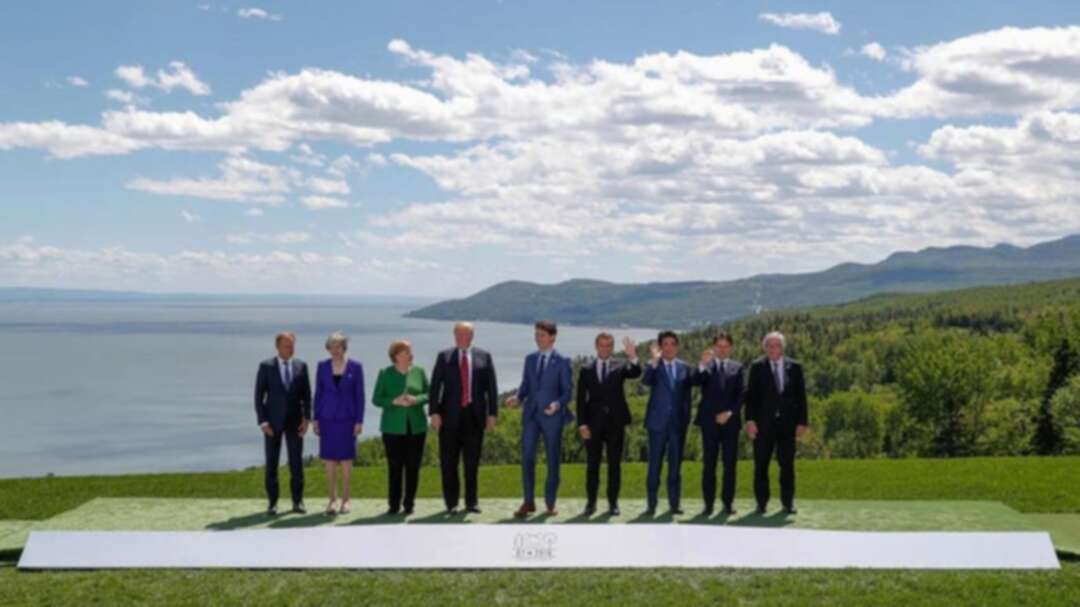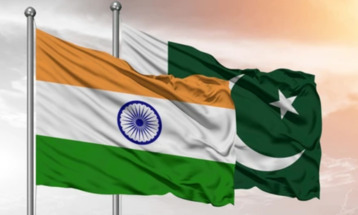-
World leaders begin arriving in France for G7 summit

Leaders of the G7 nations began arriving in France on Saturday for a summit as a US-China row over protectionism highlighted President Emmanuel Macron’s tough task in delivering real results on trade, Iran and climate change.
The three-day meeting in the Atlantic seaside resort of Biarritz takes place amid sharp differences over a clutch of global issues that risk further dividing a group of countries already struggling to speak with one voice.
Summit host Macron wants the leaders of Britain, Canada, Germany, Italy, Japan and the United States to focus on the defense of democracy, gender equality, education and climate change, and has invited leaders from Asia, Africa and Latin America to join them for a global push on these issues.
But with the trade war between China and the United States worsening, European governments struggling to defuse tensions between Washington and Tehran and global condemnation growing over illegal fires in the Amazon, his agenda could be eclipsed.
US President Donald Trump’s history of pugnacity at multilateral gatherings, which brought last year’s G7 summit to an acrimonious conclusion, means there is scant hope for substantive agreements.
Macron was exploring holding a joint news conference with Trump at the summit’s close, a French diplomatic source said, but has already decided that, to avoid another failure, there will be no final communique.
“French President Emmanuel Macron... bills the meeting as a chance to relaunch multilateralism, promote democracy and tame globalization to ensure it works for everyone,” Stewart Patrick of the Council on Foreign Relations think tank wrote.
“More likely, the gathering will expose the political, economic and ideological fault lines threatening Western solidarity and international cooperation.”
Trump’s fireworks at the Charlevoix summit in Canada last year prompted foreign policy analysts to dub the Group of Seven nations the G6+1.
US officials said Trump would tout his policies of tax cuts and deregulation and press allies to follow his example to stave off problems with the global economy.
Hours before leaving for Biarritz, Trump reacted angrily to China’s move to impose retaliatory tariffs on more US goods, even saying he was ordering US companies to look at ways to close their operations in China. The president cannot legally compel US firms to abandon China immediately.
Trump also took aim at France’s new tax on big tech companies, threatening to tax French wine “like they’ve never seen before”. His remarks cast doubts over Macron’s chances to secure agreement at the summit on a universal digital tax.
China’s President Xi Jinping is not among the Asian leaders invited to the Biarritz summit.
Johnson’s world debut
Adding to the unpredictable dynamic between the G7 leaders are the new realities facing Brexit-bound Britain: dwindling influence in Europe and growing dependency on the United States.
New Prime Minister Boris Johnson will want to strike a balance between not alienating Britain’s European allies and not irritating Trump and possibly jeopardizing future trade ties. Johnson and Trump will hold bilateral talks on Sunday morning.
Even so, diplomats played down the likelihood of Trump and Johnson joining hands against the rest, citing Britain’s close foreign policy alignment with Europe on issues from Iran and trade to climate change.
“There won’t be a G5+2,” one senior G7 diplomat said.
Johnson said ahead of the summit that Britain would not retreat from its responsibilities on the world stage after Brexit, nor sacrifice its belief in the global order.
The remarks were a riposte to those who say leaving the European Union will diminish Britain’s influence on the global stage and force a pivot towards Trump’s unorthodox and often confrontational approach to diplomacy.
Anti-G7 demonstrators are due to protest in Hendaye on the nearby French-Spanish border but will be kept away from Biarritz by more than 13,000 police officers, backed by soldiers.
EU leaders on Friday piled pressure on Brazilian President Jair Bolsonaro over fires raging in the Amazon rainforest.
Macron said Bolsonaro had lied in playing down concerns about climate change at a G20 summit in Japan in June, and threatened to veto a trade pact between the European Union and the Mercosur bloc of South American countries.
A French diplomatic source said advisers to the G7 leaders were working on concrete initiatives to respond to the fires.
“Our house is burning. Literally. The Amazon rain forest -- the lungs which produce 20 percent of our planet’s oxygen - is on fire,” Macron tweeted in the run-up to the summit.
Reuters
Tags
You May Also Like
Popular Posts
Caricature
BENEFIT Sponsors BuildHer...
- April 23, 2025
BENEFIT, the Kingdom’s innovator and leading company in Fintech and electronic financial transactions service, has sponsored the BuildHer CityHack 2025 Hackathon, a two-day event spearheaded by the College of Engineering and Technology at the Royal University for Women (RUW).
Aimed at secondary school students, the event brought together a distinguished group of academic professionals and technology experts to mentor and inspire young participants.
More than 100 high school students from across the Kingdom of Bahrain took part in the hackathon, which featured an intensive programme of training workshops and hands-on sessions. These activities were tailored to enhance participants’ critical thinking, collaborative problem-solving, and team-building capabilities, while also encouraging the development of practical and sustainable solutions to contemporary challenges using modern technological tools.
BENEFIT’s Chief Executive Mr. Abdulwahed AlJanahi, commented: “Our support for this educational hackathon reflects our long-term strategic vision to nurture the talents of emerging national youth and empower the next generation of accomplished female leaders in technology. By fostering creativity and innovation, we aim to contribute meaningfully to Bahrain’s comprehensive development goals and align with the aspirations outlined in the Kingdom’s Vision 2030—an ambition in which BENEFIT plays a central role.”
Professor Riyadh Yousif Hamzah, President of the Royal University for Women, commented: “This initiative reflects our commitment to advancing women in STEM fields. We're cultivating a generation of creative, solution-driven female leaders who will drive national development. Our partnership with BENEFIT exemplifies the powerful synergy between academia and private sector in supporting educational innovation.”
Hanan Abdulla Hasan, Senior Manager, PR & Communication at BENEFIT, said: “We are honoured to collaborate with RUW in supporting this remarkable technology-focused event. It highlights our commitment to social responsibility, and our ongoing efforts to enhance the digital and innovation capabilities of young Bahraini women and foster their ability to harness technological tools in the service of a smarter, more sustainable future.”
For his part, Dr. Humam ElAgha, Acting Dean of the College of Engineering and Technology at the University, said: “BuildHer CityHack 2025 embodies our hands-on approach to education. By tackling real-world problems through creative thinking and sustainable solutions, we're preparing women to thrive in the knowledge economy – a cornerstone of the University's vision.”
opinion
Report
ads
Newsletter
Subscribe to our mailing list to get the new updates!






















